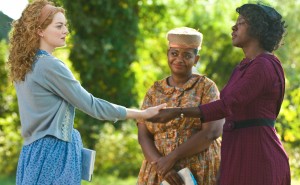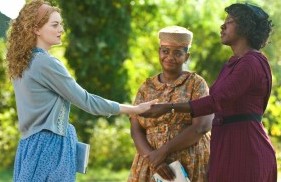‘The Help’ is an important story about the value of telling the truth

When a movie is advertised as being “based on the best-selling novel,” my expectations sometimes drop. When a story is told well in the written form, any further exploration feels like a ploy to make some more money.
This is thankfully a rule that is often broken in Hollywood. Some of our best films are adaptations.
The Help, based on the novel by Kathryn Stockett, is an exception. The movie is an effective piece of cinema that tells a depressing story of harsh racism in Jackson, Miss.
The great Viola Davis turns in a powerhouse performance as Aibileen Clark, a black maid and caretaker working in a white household. She’s paid a pittance for her grueling work, but Aibileen enjoys raising the kids entrusted to her care. She develops a deep connection to them, a connection she is unable to have with her own son, who recently died in a tragic accident.
Although the white children in the neighborhood enjoy the bountiful fruit of the love from these maids, the white mothers are much less civil. They meet for weekly bridge sessions and openly insult the help right to their faces. The ringleader of hate is Hilly Holbrook (Bryce Dallas Howard), a cruel witch of a woman who is convinced that whites and blacks need separate toilets.
The only person trying not to succumb to racist thoughts is Skeeter Phelan (Emma Stone), a young lady who seems to have a head on her shoulders. She’s a college graduate, not terribly interested in having a relationship with a man (though she’s not a lesbian, like her mother believes her to be) and recently took a job at the local newspaper to write a column about household tidbits.
When Skeeter decides to ask Aibileen for some help with the column, the young reporter realizes that there is more to the story of these black women and how they thanklessly raise white children. Like a pair of spies, Skeeter and Aibileen forge a friendship and begin setting pen to paper to tell the true story of ‘The Help.’
Minny Jackson (Octavia Spencer) is Aibileen’s best friend, and although she is reluctant at first to tell her stories, she eventually crumbles and begins spilling the beans about serving the beans. And Minny has a lot to say: She once served as the maid to Hilly Holbrook, and now she has taken a job with Celia Foote (Jessica Chastain), a beautiful lady who has been castigated by the bridge club and has no one else to turn to but Minny.
The acting is uniformly excellent. Davis is a revelation and will likely take home some Oscar gold for her layered and heartbreaking performance as Aibileen. Spencer, too, should make some room on her mantel for an Academy Award. She is able to couple dramatic reality with an often hilarious sense of humor; the character proves to be a highlight of the film.
Equally impressive is Dallas Howard and Chastain, two actresses who scarily look identical. Hilly is a tough villain to play, but Dallas Howard dedicates herself to the character and all her shortcomings. Chastain’s story line feels extraneous to the overall movie and probably works better in the book, but that doesn’t take away from her effective performance.
Stone is likable, but she is stuck in the “Luke Skywalker” role. As the leading character, Skeeter is the least interesting and falls into a few cliche plot points. Obviously a stand-in for the original novelist, the entire role feels self-indulgent and fabricated. It’s hard to believe that a recent college grad would be able to attract the eyes of a New York City publisher with nothing else except an idea for a book.
Similarly, by making the book-within-a-book a huge sensation that turns the entire caretaker industry upside down, Skeeter takes on an almost ridiculous pedestal as a change agent. The message is slightly askew: These black maids apparently can’t pull up their own bootstraps and write their way out of this horrible situation. They need a white girl with a college degree to help them. This formula of a white person coming to the rescue of an oppressed segment of society has been repeated in Hollywood for decades (think Little Big Man, Glory and Dances with Wolves, to name a few).
The fact that the Skeeter character feels out of place doesn’t take away from Stockett’s original book or Tate Taylor’s powerful film. More things are done right in The Help, and these positives should be celebrated. Too often complex race-relation stories never make it to the silver screen. Subjugation doesn’t always sell well, I suppose.
The Help proves that a movie, despite some endemic cliches, can overcome any obstacles, especially when there are stunning performances at its center. I’m not sure if this film has caused audience’s to think differently about America’s past, but it has added to the discussion.
By John Soltes / Publisher / John@HollywoodSoapbox.com-
The Help
-
2011
-
Written and directed by Tate Taylor; based on the novel by Kathryn Stockett
-
Starring Viola Davis, Emma Stone, Bryce Dallas Howard, Jessica Chastain and Octavia Spencer
-
Running time: 146 minutes
-
Rated PG-13 for thematic material
-
Rating:





